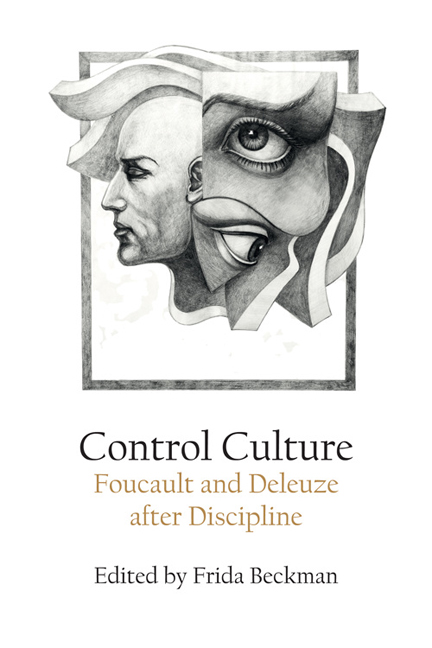Book contents
- Frontmatter
- Contents
- Acknowledgements
- Notes on Contributors
- Introduction. Control of What?
- 1 Notes from an Investigation of ‘Control Society’
- 2 Post-Mortem on Race and Control
- 3 Periodising (with) Control
- 4 Subjects of Sovereign Control and the Art of Critique in the Early Modern Period
- 5 Posthumanism, Social Complexity and the Political: A Genealogy for Foucault’s The Birth of Biopolitics
- 6 ‘That Path is for Your Steps Alone’: Popular Music, Neoliberalism and Biopolitics
- 7 Cinema in the Age of Control
- 8 Towards a ‘Minor’ Fascism: Panoptic Control and Resistant Multiplicity in TV’s Spooks
- 9 Species States: Animal Control in Phil Klay’s ‘Redeployment’
- 10 Control and a Minor Literature
- 11 Philosophy and Control
- Index
10 - Control and a Minor Literature
Published online by Cambridge University Press: 05 May 2021
- Frontmatter
- Contents
- Acknowledgements
- Notes on Contributors
- Introduction. Control of What?
- 1 Notes from an Investigation of ‘Control Society’
- 2 Post-Mortem on Race and Control
- 3 Periodising (with) Control
- 4 Subjects of Sovereign Control and the Art of Critique in the Early Modern Period
- 5 Posthumanism, Social Complexity and the Political: A Genealogy for Foucault’s The Birth of Biopolitics
- 6 ‘That Path is for Your Steps Alone’: Popular Music, Neoliberalism and Biopolitics
- 7 Cinema in the Age of Control
- 8 Towards a ‘Minor’ Fascism: Panoptic Control and Resistant Multiplicity in TV’s Spooks
- 9 Species States: Animal Control in Phil Klay’s ‘Redeployment’
- 10 Control and a Minor Literature
- 11 Philosophy and Control
- Index
Summary
No, I didn't want freedom. Only a way out – to the right or left or anywhere at all. I made no other demands. (Kafka 2015: 83)
While Gilles Deleuze's control theories have been gaining attention within fields such as philosophy and political theory, their possible effects on and in relation to the field of literature is if not an undeveloped then certainly an underdeveloped mode of enquiry. Deleuze writes in his ‘Postscript’ that there is no need to worry about the increasingly all-encompassing control mechanisms that he outlines, but that we must nonetheless search for ‘new weapons’. Here, I would like to point to how Deleuze himself, especially in his collaborations with Guattari, can help us develop such ‘weapons’ in a specifically literary context and thus help us read and understand literature in control society. Because I see this as the beginning of what I hope to be a broader engagement by literary scholars with Deleuze's conception of control, I will address what seems to be an obvious question to ask literature within such theoretical parameters: the relation between the history of the novel and discipline. The emergence of the novel in the Western world is intimately associated with the emergence of industrial capitalism and, in turn, with the focus on the individual but well-trained bourgeois subject, and it could be interesting, therefore, to think about ways in which the novel as a form and our novel reading as interpreting subjects might be affected by the continued development of disciplinary society towards the somewhat different structures and mechanisms of control society.
Theories of the development of the novel have in common an emphasis on the connection between its form and its focus on the individual. The hero of earlier literary forms, such as the epic, was never strictly speaking an individual, as György Lukács points out, but rather a representation of the relation between the parts and the whole (Lukács 1971: 66). Indeed, the focus on the general and the universal was, Mikhail Bakhtin observes, so central to the epic that it disintegrates as a form as the individual perspective increases (Bakhtin 1981: 34).
- Type
- Chapter
- Information
- Control CultureFoucault and Deleuze after Discipline, pp. 180 - 192Publisher: Edinburgh University PressPrint publication year: 2018

